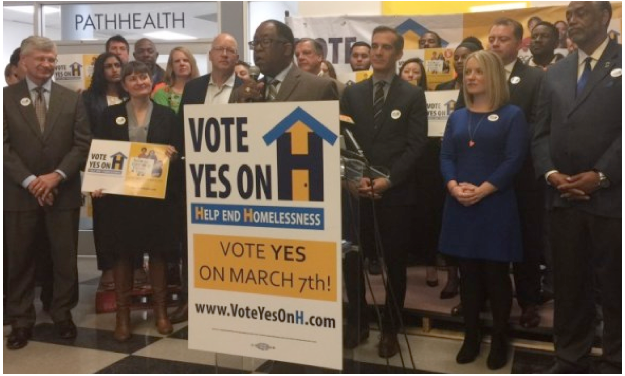CommentsDEEGAN ON LA-“Traffic and crime have been overtaken by homelessness as the defining issue for voters right now, and that’s pretty amazing,” said Tommy Newman, spokesperson for the Yes on H campaign, citing internal polls.
The homeless, seen everywhere and discussed constantly, continue to penetrate the consciousness of city leaders and citizens in the run up to the March 7 Primary Election when voters will be asked to support Measure H: The Los Angeles County Plan to Prevent and Combat Homelessness.
It will become the third part of a comprehensive plan to help the homeless. If approved, this is what we will have:
(1) County-sponsored Homeless Initiative.
A collection of strategies to prevent and combat homelessness within Los Angeles County. Approved by Supervisors in February 2016.
(2) City-sponsored Measure HHH.
$1.2 billion in general obligation bonds to buy, build, or remodel facilities for the homeless, passed by voters in November 2016.
(3) County-sponsored Measure H.
A quarter-cent sales tax that is expected to raise about $350 million every year for a decade to fund services for the homeless. Voters will decide this on March 7.
The County and City will then have moved from lots of rhetoric with zero plans, exactly one year ago, to a fully defined, funded and approved three-part program to deal with homelessness. The politicos, the homeless and the citizens should all be happy about this. Leading the surge toward a solution was the County Board of Supervisors, heavily influenced on homeless issues by Supervisor Mark Ridley-Thomas.
Measure H will fund a menu of services for the homeless that includes:
- mental health
- substance abuse treatment
- health care
- education
- job training
- rental subsidies
- emergency and affordable housing
- transportation
- outreach
Funds will also be applied to programs for the prevention and supportive services for homeless children, families, foster youth, veterans, battered women, seniors, disabled individuals, and other homeless adults.
What voter could say no to this? So far, there is no organized opposition, nor is there anyone speaking out singly about the proposed measure. Hopefully, very few will oppose it, and the city will start making a dent in the chronic problem of homelessness.
Los Angeles County Supervisor Mark Ridley-Thomas, a leader in efforts to support the homeless, gave shape to the measure by describing it as “a critical component in the fight against homelessness and part of an effective one-two punch along with HHH.”
Approved by 77% of voters in November, Measure HHH allows the City to issue up to $1.2 billion in general obligation bonds to buy, build, or remodel facilities to provide temporary shelters, supportive housing for individuals and families with low income, homeless veterans, and facilities, such as storage and showers.
“Measures H and HHH complement each other by providing necessary ongoing revenue specifically allocated to funding vital and essential supportive services for homeless children, women and men, while seeking to build thousands of permanent supportive housing units,” says Ridley-Thomas.
Yes on H’s Newman rounds out this scenario, adding, “The Proposition HHH bond measure (permanent supportive housing, supporting chronically homeless) and H work together and complement each other. Measure H focuses on strategies that are more immediate in their impact -- like street outreach and short term housing as well as paying for supportive services that are part of permanent housing. The scale and scope of what Measure H does is comprehensive and broad -- and covers the entire County of LA. It’s not simply the other half of Proposition HHH -- it's that and more.”
Another impact, unique because it’s not been at the top of anyone’s list, is the prevention of homelessness that, says Newman, “is being looked for the first time. Measure H allows the assistance to go upstream and prevent the flow of families and individuals into homelessness. Historically, we have primarily dealt with the consequences of homelessness and used our emergency responders -- like the police and fire departments -- to treat those issues. Measure H invests in preventative solutions. Measure H, for the first time, will direct resources to keeping people in their homes, as opposed to waiting until they've lost that stability. It's a smart goal to try to prevent homelessness instead waiting until everything has fallen apart in someone’s life.”
How will we know if this measure works? Newman explains that “Measure H has significant accountability and transparency components: it will take a 2/3 vote to pass and the funds can legally only be spent on the strategies to end homelessness that are called out in the law -- the funding can't be used for other purposes by county government…the measure includes a citizens oversight committee to monitor how the funds are spent and an annual public audit.”
Adds Ridley-Thomas, "Our objective here is to evidence that we are serious about accountability, serious about transparency and to be comprehensive as is committed in the ballot language."
You can bet on that; now, you can go vote on it.
(Tim Deegan is a long-time resident and community leader in the Miracle Mile, who has served as board chair at the Mid City West Community Council and on the board of the Miracle Mile Civic Coalition. Tim can be reached at [email protected].) Edited for CityWatch by Linda Abrams.
Sidebar
Our mission is to promote and facilitate civic engagement and neighborhood empowerment, and to hold area government and its politicians accountable.

 CityWatch Los Angeles
Politics. Perspective. Participation.
CityWatch Los Angeles
Politics. Perspective. Participation.
27
Fri, Feb














